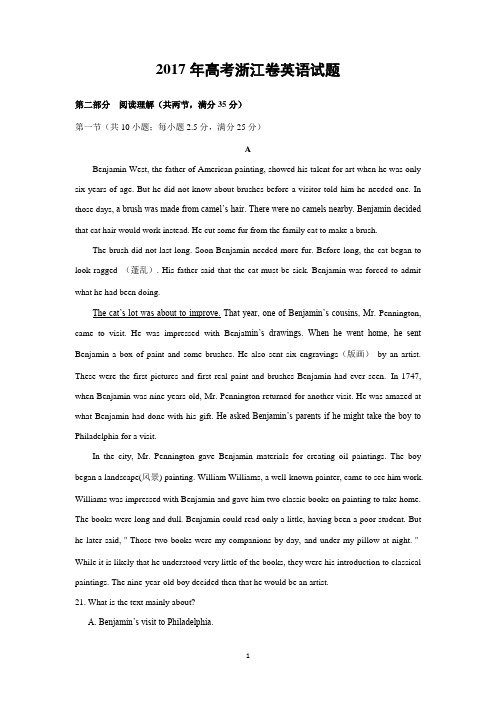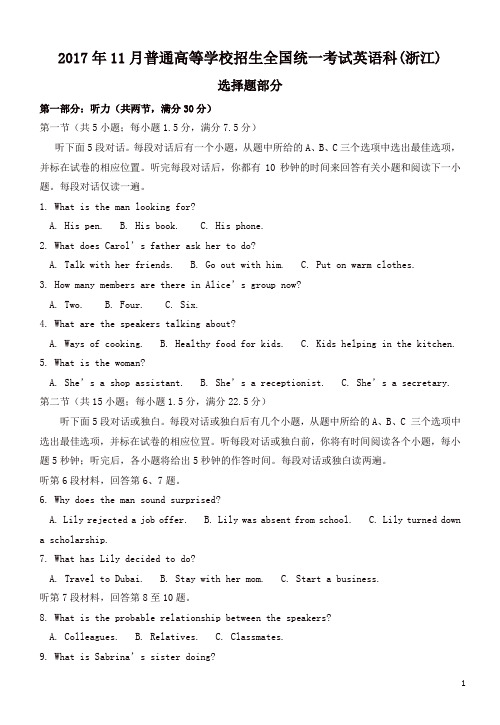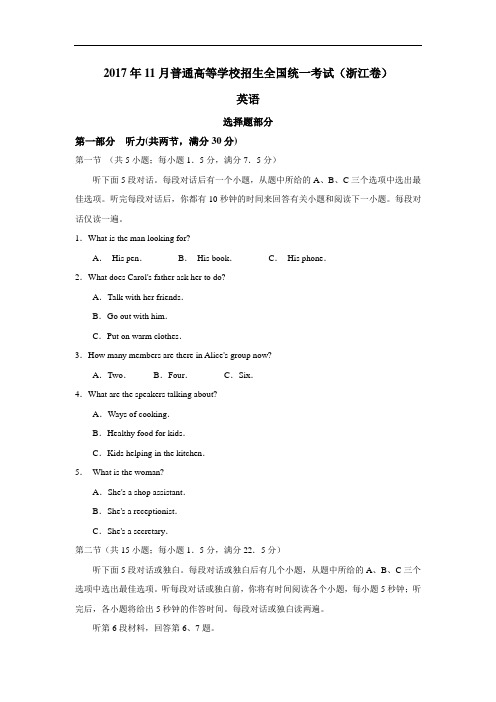浙江省2017年11月高考英语试题[含答案解析]
2017年11月浙江省高考英语读后续写试题分析及范例点评

2017年11月浙江省高考英语读后续写试题分析及范例点评2017年11月浙江省高考英语科目写作第二节依然是读后续写,要求考生阅读一篇短文,根据所给情节续写,使短文与续写部分合成一个完整的故事。
自2016年10月实行新高考以来,三次英语考试写作第二节均为读后续写,之所以如此,其中一个原因可能是,相比于其他类型考题而言,读后续写对测试学生的实际写作水平具有较高的有效性。
这一点,从本次考试的试题与答题情况也可看出。
一、题型分析与上两次考试一样,本次读后续写题依然是结合了对考生输入(input)与输出(output)两种语言能力的考查(关于这两者能力的考查和读后续写文体特征等,请参见笔者发表于本刊2017年第3期的《浙江省高考英语读后续写试题分析及范例点评》一文)。
但是,虽然同属记叙文,本次考试所给短文的故事线索与逻辑复杂程度明显高于上两次,主要表现为次要信息较多,对考生把握情节主线有较强的干扰(具体见本文“试题要点分析”和“答题建议”)。
从这一点来看,本次考试对考生的输入考查要求远高于上两次。
另外,从所给段落开头语来看,第二段的开放性很强,考生可以有多种情节接续的可能,甚至可以有体裁的转换。
结合这两点,可以说,本次读后续写交际任务是否能很好地完成,基本上取决于对所给短文阅读理解任务完成的情况。
这给我们的启示是,读后续写教学要见成效,阅读教学上所花的功夫绝对不能少。
二、题目要求阅读下面短文,根据所给情节进行续写,使之构成一个完整的故事。
A Vacation with My MotherI had an interesting childhood. It was filled with surprises and amusements,all because of my mother―loving,sweet,and yet absent-minded and forgetful. One strange family trip we took when I was eleven tells a lot about her.My two sets of grandparents lived in Colorado and North Dakota,and my parents decided to spend a few weeks driving to those states and seeing all the sights along the way. As the first day of our trip approached,David,my eight-year-old brother,and I unwillingly said good-bye to all of our friends. Who knew if we’d ever see them again?Finally,the moment of our departure arrived,and we loaded suitcases,books,games,camping equipment,and a tent into the car and bravely drove off. We bravely drove off again two hours later after we’d returned home to get the purse and traveler’s checks Mom had forgotten.David and I were always a little nervous when using gas station bathrooms if Mom was driving while Dad slept:“You stand outside the door and play lookout (放哨)while I go,and I’ll stand outside the door and play lookout while you go.”I had terrible pictures in my mind:“Honey,where are the kids?”“What?!Oh,Gosh…I thought they were being awfully quiet.”We were never actually left behind in a strange city,but we weren’t about to take any chances.On the fourth or fifth night,we had trouble finding a hotel with a vacancy. After driving in vain for some time,Mom suddenly got a great idea:Why didn’t we find a house with a likely-looking backyard and ask if we could set up tent there?David and I became nervous. To our great relief,Dad turned down the idea. Mom never could understand our objections (反?Γ?. If a strange family showed up on her front doorsteps,Mom would have been delighted. She thinks everyone in the world is as nice as she is. We finally found a vacancy in the next town. 注意:1.所?m写短文的词数应为150左右;2.至少使用5个短文中标有下划线的关键词语;3.续写部分分为两段,每段的开头语已为你写好;4.续写完成后,请用下划线标出你所使用的关键词语。
2017年11月浙江卷(健忘妈妈趣事)——新高考英语读后续写历年真题解析(PPT课件)

读后续写真题
2017年6月浙江卷:健忘妈妈趣事
距离高考还有一段时间,不少有经验的老师都会提醒考生,愈是临近高考,
能否咬紧牙关、学会自我调节,态度是否主动积极,安排是否科学合理,能不 能保持良好的心态、以饱满的情绪迎接挑战,其效果往往大不一样。以下是本 人从事10多年教学经验总结出的超实用新高考英语专题复习:词汇记忆——字 母串记讲义希望可以帮助大家提高答题的正确率,希望对你有所帮助,有志者 事竟成!
TwheerennJ’teaffbonuotttiocetadkestaenaymchsahnocoest.ing out of the pot and the lid starting to shake. The next minute, the porridge boiled over and put out
A MOTHER’S DAY SURPRISE Avacationwithmymother
I had an interesting childhood. It was filled with surprise and amusements, all because of my mother — loving, sweet, and yet absent-minded
2017年高考浙江卷英语试题及答案解析

2017年高考浙江卷英语试题第二部分阅读理解(共两节,满分35分)第一节(共10小题;每小题2.5分,满分25分)ABenjamin West, the father of American painting, showed his talent for art when he was only six years of age. But he did not know about brushes before a visitor told him he needed one. In those days, a brush was made from camel’s hair. There were no camels nearby. Benjamin decided that cat hair would work instead. He cut some fur from the family cat to make a brush.The brush did not last long. Soon Benjamin needed more fur. Before long, the cat began to look ragged (蓬乱). His father said that the cat must be sick. Benjamin was forced to admit what he had been doing.The cat’s lot was about to improve.That year, one of Benjamin’s cousins, Mr. Pennington, came to visit. He was impressed with Benja min’s drawings. When he went home, he sent Benjamin a box of paint and some brushes. He also sent six engravings(版画)by an artist. These were the first pictures and first real paint and brushes Benjamin had ever seen.In 1747, when Benjamin was nine years old, Mr. Pennington returned for another visit. He was amazed at what Benjamin had done with his gift. He asked Benjamin’s parents if he might take the boy to Philadelphia for a visit.In the city, Mr. Pennington gave Benjamin materials for creating oil paintings. The boy began a landscape(风景) painting. William Williams, a well-known painter, came to see him work. Williams was impressed with Benjamin and gave him two classic books on painting to take home. The books were long and dull. Benjamin could read only a little, having been a poor student. But he later said,"Those two books were my companions by day, and under my pillow at night."While it is likely that he understood very little of the books, they were his introduction to classical paintings. The nine-year-old boy decided then that he would be an artist.21. What is the text mainly about?A. Benjamin’s visit to Philadelphia.B. Williams’ influence on Benjamin.C. The beginning of Benjamin’s life as an artist.D. The friendship between Benjamin and Pennington.22. What does the underlined sentence in paragraph 3 suggest?A. The cat would be closely watched.B. The cat would get some medical care.C. Benjamin would leave his home shortly.D. Benjamin would have real brushes soon.23. What did Pennington do to help Benjamin develop his talent?A. He took him to see painting exhibitions.B. He provided him with painting materials.C. He sent him to a school in Philadelphia.D. He taught him how to make engravings.24. Williams’ two books helped Benjamin to ________.A. master the use of paintsB. appreciate landscape paintingsC. get to know other paintersD. make up his mind to be a painter【解析】试题分析:本文属于记叙文,主要讲了美国绘画之父Benjamin在决定要成为一名画家之前的经历。
2017年高考英语全国卷1含答案解析

徐老师2017年普通高等学校招生全国统一考试英语(考试时间:120分钟试卷满分:150分)注意事项:1.答卷前,考生务必将自己的姓名、准考证号填写在答题卡上。
2.回答选择题时,选出每小题答案后,用铅笔把答题卡上对应题目的答案标号涂黑。
如需改动,用橡皮擦干净后,再选涂其他答案标号。
回答非选择题时,将答案写在答题卡上,写在本试卷上无效。
3.考试结束后,将本试卷和答题卡一并交回。
第一部分听力(共两节,满分30分)做题时,先将答案标在试卷上。
录音内容结束后,你将有两分钟的时间将试卷上的答案转涂到答题卡上。
第一节(共5小题;每小题1.5分,满分7.5分)听下面5段对话。
每段对话后有一个小题,从题中所给的A、B、C三个选项中选出最佳选项。
听完每段对话后,你都有10秒钟的时间来回答有关小题和阅读下一小题。
每段对话仅读一遍。
例:How much is the shirt?A.£19.15.B.£9.18.C.£9.15.答案是C。
1.What does the woman think of the movie?A.It’s amusing.B.It’s exciting.C.It’s disappointing.2.How will Susan spend most of her time in France?A.Traveling around.B.Studying at a school.C.Looking after her aunt.3.What are the speakers talking about?A.Going out.B.Ordering drinks.C.Preparing for a party.4.Where are the speakers?A.In a classroom.B.In a library.C.In a bookstore.5.What is the man going to do?A.Go on the Internet.B.Make a phone call.C.Take a train trip.第二节(共15小题;每小题1.5分,满分22.5分)听下面5段对话或独白。
完整版2017新课标全国卷3高考英语试题和答案解析

WORD格式整理绝密★启用前2017年普通高等学校招生全国统一考试英语(考试时间:120分钟试卷满分:150分)注意事项:1.答卷前,考生务必将自己的姓名、准考证号填写在答题卡上。
3.回答选择题时,选出每小题答案后,用铅笔把答题卡上对应题目的答案标号涂黑。
如需改动,用橡皮擦干净后,再选涂其他答案标号。
回答非选择题时,将答案写在答题卡上,写在本试卷上无效。
3.考试结束后,将本试卷和答题卡一并交回。
第一部分听力(共两节,满分30分)做题时,先将答案标在试卷上,录音结束后,你将有两分钟的时间将试卷上的答案转涂到答题卡上。
第一节(共5小题,每小题1.5分,满分7.5分)听下面5段对话,每段对话后有一个小题,从题中所给的A、B、C三个选项中选出最佳答案。
听完每段对话后,你都有10秒钟的时间来回答有关小题和阅读下一小题。
每段对话仅读一遍。
例:How much is the shirt?A.£ 19.15. B.£9.18. C.£9.15.答案是C。
1.What will the woman do this afternoon?A.Do some exercise. B.Go shopping. C. Wash her clothes.2.Why does the woman call the man?A .To cancel a flight. B. To make an apology. C. To put off a meeting. 3.How much more does David need for the car?A.$ 5,000. B.$20,000. C.$25,000.4.What is Jane doing?A.Planning a tour. B.Calling her father. C.Asking for leave.专业知识分享WORD格式整理5 .How does the man feel?A.Tied. B.Dizzy. C.Thirsty.第二节(共15小题;每小题1.5分,满分22.5分)听下面5段对话或独白。
2017年11月浙江英语高考完整真题及答案

2017年11月普通高等学校招生全国统一考试英语科(浙江)选择题部分第一部分:听力(共两节,满分30分)第一节(共5小题;每小题1.5分,满分7.5分)听下面5段对话。
每段对话后有一个小题,从题中所给的A、B、C三个选项中选出最佳选项,并标在试卷的相应位置。
听完每段对话后,你都有10秒钟的时间来回答有关小题和阅读下一小题。
每段对话仅读一遍。
1. What is the man looking for?A. His pen.B. His book.C. His phone.2. What does Carol’s father ask her to do?A. Talk with her friends.B. Go out with him.C. Put on warm clothes.3. How many members are there in Alice’s group now?A. Two.B. Four.C. Six.4. What are the speakers talking about?A. Ways of cooking.B. Healthy food for kids.C. Kids helping in the kitchen.5. What is the woman?A. She’s a shop assistant.B. She’s a receptionist.C. She’s a secretary. 第二节(共15小题;每小题1.5分,满分22.5分)听下面5段对话或独白。
每段对话或独白后有几个小题,从题中所给的A、B、C 三个选项中选出最佳选项,并标在试卷的相应位罝。
听每段对话或独白前,你将有时间阅读各个小题,每小题5秒钟;听完后,各小题将给出5秒钟的作答时间。
每段对话或独白读两遍。
听第6段材料,回答第6、7题。
6. Why does the man sound surprised?A. Lily rejected a job offer.B. Lily was absent from school.C. Lily turned downa scholarship.7. What has Lily decided to do?A. Travel to Dubai.B. Stay with her mom.C. Start a business.听第7段材料,回答第8至10题。
2017年11月份高考英语试题(浙江卷含答案)

2017年11月普通高等学校招生全国统一考试(浙江卷)英语选择题部分第一部分听力(共两节,满分30分)第一节(共5小题;每小题1.5分,满分7.5分)听下面5段对话。
每段对话后有一个小题,从题中所给的A、B、C三个选项中选出最佳选项。
听完每段对话后,你都有10秒钟的时间来回答有关小题和阅读下一小题。
每段对话仅读一遍。
1.What is the man looking for?A.His pen.B.His book.C.His phone.2.What does Carol's father ask her to do?A.Talk with her friends.B.Go out with him.C.Put on warm clothes.3.How many members are there in Alice's group now?A.Two.B.Four.C.Six.4.What are the speakers talking about?A.Ways of cooking.B.Healthy food for kids.C.Kids helping in the kitchen.5.What is the woman?A.She's a shop assistant.B.She's a receptionist.C.She's a secretary.第二节(共15小题;每小题1.5分,满分22.5分)听下面5段对话或独白。
每段对话或独白后有几个小题,从题中所给的A、B、C三个选项中选出最佳选项。
听每段对话或独白前,你将有时间阅读各个小题,每小题5秒钟;听完后,各小题将给出5秒钟的作答时间。
每段对话或独白读两遍。
听第6段材料,回答第6、7题。
6.Why does the man sound surprised?A.Lily rejected a job offer.B.Lily was absent from school.C.Lily turned down a scholarship.7.What has Lily decided to do?A.Travel to Dubai.B.Stay with her mom.C.Start a business.听第7段材料,回答第8至10题。
2017年高考英语浙江卷-答案

第三部分语言运用
第一节完形填空
36.【答案】A
【解析】根据下文可知,爱书人士经常到Alia的图书馆看书,分享知识,对于这些人来说,该图书馆是一个聚会处,故选meeting。
37.【答案】D
【解析】结合语境可知,他们在这里讨论全世界各种各样的事情,故选discussed,表示“讨论,议论”。
第二节
56.【答案】carrots
【解析】根据上文的“ahandful of”可知,此处表示一把小胡萝卜,所以应用carrot的复数形式。
【考点】考察名词单复数。
57.【答案】shiny/shining
【解析】根据上文的“a”及下文的名词“object”可知,此处需要用形容词作定语修饰名,故填shiny或shining。
52.【答案】B
【解析】一天,轰炸停止了,士兵们也离开了,所以选soldiers。
53.【答案】D
【解析】根据下文可知,Alia知道,要想这些书安全,好啊。他们必须在城市安静的时候把这些书再转移(moved)出去。
54.【答案】C
【解析】参见上题解析。quiet表示“安静的”。
55.【答案】A
【解析】根据语境可知,Alia等待着战争的结束,梦想着(拥有)和平和一个新图书馆。dream of表示“梦想,期盼”。
【解析】参见上题解析。
43.【答案】D
【解析】根据语境可知,每晚很晚下班后,Alia偷偷地把书带回家。secretly“秘密地,偷偷地”符合语境。
44.【答案】C
【解析】根据上下文语境及下文的“her car”可知,Alia把书装到她的汽车里运回家。fill表示“装满”。
45【答案】B
【解析】根据下文的内容可知战争爆发后,她的朋友们也赶来帮助(help)她。
- 1、下载文档前请自行甄别文档内容的完整性,平台不提供额外的编辑、内容补充、找答案等附加服务。
- 2、"仅部分预览"的文档,不可在线预览部分如存在完整性等问题,可反馈申请退款(可完整预览的文档不适用该条件!)。
- 3、如文档侵犯您的权益,请联系客服反馈,我们会尽快为您处理(人工客服工作时间:9:00-18:30)。
浙江省2017年十一月英语高考试题听力部分:ACBCB/ CBABC / ACBAB / AABCA阅读理解:AWhen I was in fourth grade, I worked part-time as a paperboy. Mrs.Stanley was one of my customers. She'd watch me coming down her street, and by the time I'd biked up to her doorstep, there'd be a cold drink waiting. I'd sit and drink while she talked.Mrs.Stanley talked mostly about her dead husband, "Mr. Stanley and I went shopping this morning." she'd say. The first time she said that, soda(汽水) went up my nose.I told my father how Mrs. Stanley talked as if Mr. Stanley were still alive. Dad said she was probably lonely, and that I ought to sit and listen and nod my head and smile, and maybe she'd work it out of her system. So that's what I did, and it turned out Dad was right. After a while she seemed content to leave her husband over at the cemetery(墓地).I finally quit delivering newspapers and didn't see Mrs. Stanley for several years. Then we crossed paths at a church fund-raiser(募捐活动). She was spooning mashed potatoes and looking happy. Four years before, she'd had to offer her paperboy a drink to have someone to talk with. Now she had friends. Her husband was gone, but life went on.I live in the city now, and my paperboy is a lady named Edna with three kids. She asks me how I'm doing. When I don't say "fine", she sticks around to hear my problems. She's lived in the city most of her life, but she knows about community. Community isn't so much a place as it is a state of mind. You find it whenever people ask how you're doing because they care, and not because they're getting paid to do so. Sometimes it's good to just smile, nod your head and listen.21. Why did soda go up the author's nose one time?A. He was talking fast.B. He was shocked.C. He was in a hurry.D. He was absent-minded.22. Why did the author sit and listen to Mrs. Stanley according to Paragraph 3?A. He enjoyed the drink.B. He wanted to be helpful.C. He took the chance to rest.D. He tried to please his dad.23. Which of the following can replace the underlined phrase "work it our of her system"?A. recover from her sadnessB. move out of the neighborhoodC. turn to her old friendsD. speak out about her past24. What does the author think people in a community should do?A. Open up to others.B. Depend on each other.C. Pay for other's helpD. Care about one another.BIt's surprising how much simple movement of the body can affect the way we think. Using expansive gestures with open arms makes us feel more powerful, crossing your arms makes you more determined and lying down can bring more insights(领悟).So if moving the body can have these effects, what about the clothes we wear? We're all well aware of how dressing up in different ways can make us feel more attractive, sporty or professional, depending on the clothes we wear, but can the clothes actually change cognitive(认知) performance or is it just a feeling?Adam and Galinsky tested the effect of simply wearing a white lab coat on people's powers of attention. The idea is that white coats are associated with scientists, who are in turn thought to have close attention to detail.What they found was that people wearing white coats performed better than those who weren't. Indeed, they made only half as many errors as those wearing their own clothes on the Stroop Test(one way of measuing attention). The reserchrs call the effect "enclothed cognition," suggesting that all manner of different clothes probably affect our cognition in many differnt ways.This opens the way for all sorts of clothes-based experiments. Is the writer who wears a fedora more creative? Is the psychologist wearing little round glasses and smoking a cigar more insightful? Does a chef's hat make the restaurant food taste better?From now on I will only be editing artcles for PsyBlog while wearing a white coat to help keep the typing error count low. Hopefully you will be doing your part by reading PsyBlog in a cap and gown(学位服).25. What is the main idea of the text?A. Body movements change the way people think.B. How people dress has an influencee on their feelings.C. What people wear can affect their cognitive performance.D. People doing different jobs should wear different clothes.26. Adam and Galinsky's experiment tested the effect of clothes on theirwearers'______.A. insightsB. movementsC. attentionD. appearance27. How does the author sound in the last paragraph?A. Academic.B. Humorous.C. Formal.D. Hopeful.CThere are energy savings to be made from all recyclable materials, sometimes huge savings. Recycling plastics and aluminum, for instance, uses only 5% to 10% as much energy as producing new plastic or smelting(提炼)aluminum.Long before most of us even noticed what we now call "the environment," Buckminster Fuller said, "Pollution is nothing but the resources(资源)we are not harvesting. We allow them to be left around because we've been ignorant of their value." To take one example, let's compare the throwaway economy(经济)with a recycling economy as we feed a cat for life.Say your cat weigh 5kg and eats one can of food each day. Each empty can of its food weights 40g. In a throwaway economy, you would throw away 5,475 cans over the cat's 15-year lifetime. That's 219kg of steel-more than a fifth of a ton and more than 40 times the cat's weight.In a recycling economy, we would make one set of 100 cans to start with, then replace them over and over again with recycled cans. Since almost 3% of the metal is lost during reprocessing, we'd have to make an extra 10 cans each year. But in all, only150 cans will be used up over the cat's lifetime-and we'll still have 100 left over for the next cat.Instead of using up 219kg of steel, we've used only 6kg. And because the process of recycling steel is less polluting than making new steel, we've also achieved the following significant savings: in energy use-47% to 74%; in air pollution-85%; in water pollution-35%; in water use-40%.28. What does Buckminster Fuller say about pollution?A. It is becoming more serious.B. It destroys the environment.C. It benefits the economy.D. It is the resources yet to be used.29. How many cans will be used up in a cat's 15-year lifetime in a recycling economy?A. 50B. 100C. 150D. 25030. What is the author's purpose in writing the text?A. To promote the idea of recycling.B. To introduce an environmentalist.C. To discuss the causes of pollution.D. To defend the throwaway economy.How to Remember What You ReadReading is important. But the next step is making sure that you remember what you've read! __31__you may have just read the text. But the ideas, concepts and images (形象)may fly right out of your head. Here are a few tricks for remembering what you read.● __32__If the plot, characters, or word usage is confusing for you, you likely won't be able to remember what you read. It's a bit like reading a foreign language. If you don't understand what you're reading, how would you remember it? But there are a few things you can do... Use a dictionary; look up the difficult words.● Are you connected?Does a character remind you of a friend? Does the setting make you want to visit the place? Does the book inspire you, and make you want to read more? With some books, you may feel a connection right away. __33__ How willing are you to make the connections happen?● Read it; hear it; be it!Read the lines. Then, speak them out loud. And, put some character into the words. When he was writing his novels, Charles Dickens would act out the parts of the characters. He'd make faces in the mirror, and change his voice for each character. __34__● How often do you read?If you read frequently, you'll likely have an easier time with remembering what you’re reading and what you've read. __35__As you make reading a regular part of your life, you'll make more connections, stay more focused and understand the text better. You’ll learn to enjoy literature- as you remember what you read!A. Are you confused?B. Practice makes perfect.C. What's your motivation?D. Memory is sometimes a tricky thing.E. Marking helps you remember what you read.F. But other books require a bit more work on your part.G. You can do the same thing when you are reading the text!31-35 DAFGB完型填空A young English teacher saved the lives of 30 students when he took__36__ of a bus after its driver suffered a serious heart attack. Guy Harvold,24, had __37__ the students and three course leaders from Gatwick airport, and they were travelling to Bourme mouth to __38__ their host families. They were going to __39__ a course at the ABC Language School in Bournemouth where Harvold works as a __40__.Harvold, who has not __41__ his driving test, said, "I realized the bus was out of control when I was __42__ the students." The bus ran into trees at the side of the road and he __43__the driver was slumped(倒伏) over the wheel. The driver didn't __44__. He was unconscious. The bus__45__ a lamp post and it broke the glass on the front door before Harvold __46__ to bring the bus to a stop. Police__47__ the young teacher's quick thinking. If he hadn't __48__ quickly, there could have been a terrible__49__.The bus driver never regained consciousness and died at Easy Surrey Hospital. He had worked regulary with the __50__ and was very well regarded by the teachers and students. Harvold said, "I was __51__ that no one else was hurt, but I hoped that the driver would __52__.语法填空Easy Ways to Build VocabularyIt's not all that hard to build an advanced and large vocabulary. Like many things in life, it's __56__ongoing process, and the best part of the process is that there's enough room for improvement, __57__means you'll just keep getting better and better. Of course you have to work at it. You wouldn't think that a few __58__(month) of exercise in your teens would be enough __59__ the rest of your life, and that's also true for building your vocabulary--you have to keep at it daily, and pretty soon you will find that you have an excellent vocabulary.One of the __60__(effect) ways to build vocabulary is to read good books. You need to __61__(real) read at least one good book a week, preferably a classic. This isn't as hard as it __62__(sound), and it is far better than any other method because you improve your vocabulary while __63__(read) an interesting piece of literature. Another nice thing is that you learn both new words and __64__(they) use unconsciously, meaning that you will tend to use the words __65__(learn) this way in conversations almost automatically.参考答案56. an 57. which 58. months59. for 60. most effective 61. really 62. sounds 63. reading64. their (后面的use是名词)65. learned (过去分词作后置定语修饰words)【应用文写作】假如你是李华,你们学校的外教Mr. Hall寒假不回国。
